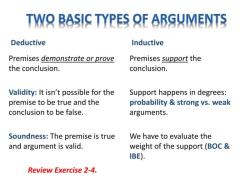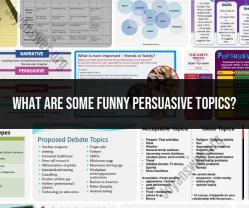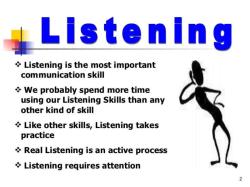What constitutes a good argument?
A good argument is one that is persuasive, well-structured, and based on sound reasoning. Whether you're writing an essay, participating in a debate, or simply trying to persuade someone of your point of view, here are the essentials of crafting a good argument:
Clear Thesis Statement: Start your argument with a clear and concise thesis statement that presents your main argument or position. This statement should be specific and debatable.
Strong Supporting Evidence: Provide evidence to support your thesis statement. This evidence can come from various sources, including research, data, statistics, expert opinions, personal experiences, and examples. Ensure that your evidence is relevant, credible, and up-to-date.
Logical Reasoning: Construct your argument using logical reasoning. Your points should follow a logical sequence, and there should be a clear connection between your thesis statement, evidence, and conclusions. Avoid fallacies or faulty logic.
Counterarguments: Address and refute counterarguments. Acknowledge opposing viewpoints and explain why your argument is stronger. This demonstrates that you've considered other perspectives and strengthens your position.
Organization: Organize your argument in a coherent and structured manner. Use clear headings, subheadings, and paragraphs to make your argument easy to follow. Chronological, cause-and-effect, or problem-solution structures can be effective, depending on your topic.
Clarity and Conciseness: Write clearly and concisely. Avoid jargon or overly complex language that might confuse your audience. Use straightforward and easily understandable language.
Persuasive Language: Use persuasive language to appeal to your audience's emotions, values, and beliefs. Rhetorical devices like ethos, pathos, and logos can be effective in swaying opinions.
Thorough Research: Conduct thorough research to gather relevant information and data to support your argument. Be prepared to cite your sources properly, following the appropriate citation style.
Engage Your Audience: Consider your target audience and tailor your argument to their values and interests. Anticipate their concerns and objections, and address them in your argument.
Consistency: Ensure that your argument remains consistent throughout. Avoid contradictory statements or changing your position without providing a valid reason for doing so.
Use of Examples: Illustrate your points with concrete examples. Real-life anecdotes and examples can make your argument more relatable and memorable.
Analogies and Comparisons: Use analogies or comparisons to help your audience better understand complex concepts. Drawing parallels with familiar situations can enhance comprehension.
Ethical Considerations: Consider the ethical implications of your argument. Ensure that your argument is grounded in moral and ethical principles, and avoid making unfounded or harmful claims.
Conclusion: Summarize your main points and restate your thesis in the conclusion. End with a compelling closing statement that reinforces your argument and leaves a lasting impression.
Revision and Proofreading: Carefully revise and proofread your argument to eliminate grammar and spelling errors. A well-edited argument is more convincing and credible.
Feedback: Seek feedback from others, whether it's peers, instructors, or colleagues. Constructive criticism can help you refine and strengthen your argument.
Remember that the effectiveness of an argument can vary depending on the context and audience. What persuades one group may not persuade another. Tailor your approach to suit your specific goals and the expectations of your audience.
Principles of Logical, Persuasive Argumentation
A logical, persuasive argument is one that is well-structured, supported by evidence, and relevant to the audience. It should be clear, concise, and easy to understand. The following are some of the key principles of logical, persuasive argumentation:
- Have a clear thesis statement: The thesis statement is the main point of your argument. It should be clear, concise, and arguable.
- Support your thesis statement with evidence: Evidence can be in the form of facts, statistics, expert opinions, or personal experiences.
- Use logical reasoning: Your argument should be based on logical reasoning. This means that your premises (the statements that support your thesis statement) should be true and relevant to your conclusion.
- Address counterarguments: Counterarguments are arguments that oppose your thesis statement. It is important to address counterarguments in your argument in order to show that your thesis statement is still valid.
Elements of a Convincing and Effective Argument
A convincing and effective argument will typically include the following elements:
- A strong thesis statement: The thesis statement should be clear, concise, and arguable. It should also be relevant to the audience.
- Supporting evidence: The evidence should be credible and relevant to the thesis statement. It should also be sufficient to support the thesis statement.
- Logical reasoning: The argument should be based on logical reasoning. This means that the premises should be true and relevant to the conclusion.
- A rebuttal of counterarguments: The argument should address any potential counterarguments in order to show that the thesis statement is still valid.
- An appeal to the audience: The argument should appeal to the audience's emotions, values, or interests in order to make them more likely to accept the thesis statement.
3. Building Strong Arguments Using Reason, Evidence, and Skill
There are a number of things you can do to build strong arguments using reason, evidence, and skill. Here are a few tips:
- Do your research: Before you start writing your argument, make sure you have a good understanding of the topic. Gather evidence from a variety of credible sources.
- Organize your thoughts: Once you have gathered your evidence, take some time to organize your thoughts. This will help you to write a clear and concise argument.
- Use logical reasoning: Make sure your argument is based on logical reasoning. This means that your premises should be true and relevant to your conclusion.
- Address counterarguments: Don't be afraid to address counterarguments in your argument. This will show that you have considered all sides of the issue and that your argument is still valid.
- Appeal to the audience: Consider your audience when writing your argument. Tailor your argument to their interests and values.
Here are some additional tips for building strong arguments:
- Use clear and concise language: Avoid using jargon or technical language that your audience may not understand.
- Be specific: Don't make vague generalizations. Instead, use specific examples and data to support your points.
- Be objective: Try to avoid using emotional language or logical fallacies in your argument.
- Be open to feedback: Get feedback on your argument from others. This will help you to identify any areas where you can improve.
By following these tips, you can learn to build strong and persuasive arguments that will help you to achieve your goals.












